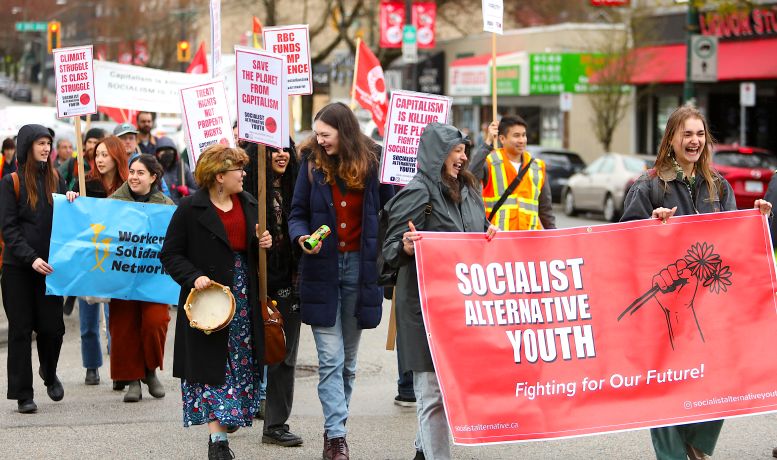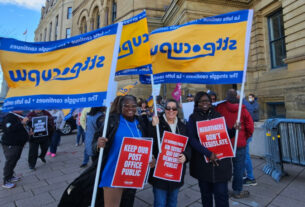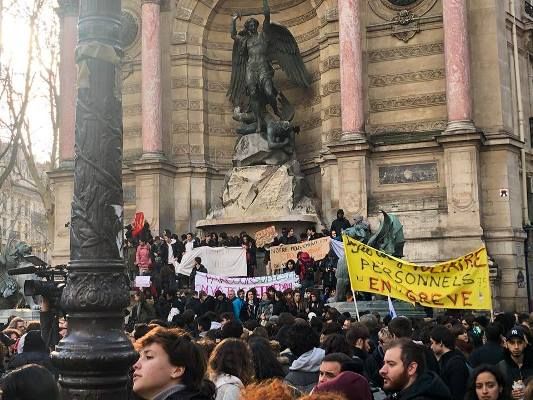The last few years have been marked by the acceleration of the ecological, agricultural, and oceanic devastation brought on by climate change. In August of 2022, Pakistan suffered a wave of devastating floods that covered a third of the country in water and destroyed over two million homes along with over four million acres of agricultural land — severely impacting housing and food security in the country. On the opposite side of the spectrum, at the same time, Western and Southern Europe recorded the worst drought seen in over five hundred years. This year, Chile has suffered from a wave of forest fires caused by a mega-drought the country has been suffering from since 2010. These forest fires have destroyed around 1.1 million acres of land and have released large clouds of soot and ash that harm people’s air quality. Climate change was considered one of the leading causes in all three cases, and they each highlight the need for a move away from the capitalist economy that dominates the world.
Despite the hemming and hawing from governments about a “Just Transition,” little has been done on this transition. Instead, governments in Canada and around the world continue to subsidize the expansion of fossil fuel production. Investments made in so-called green technology are driven by the potential to make profits, not by their impact on climate change. The Canadian government is giving $13 billion to Volkswagen to construct a car battery plant in Ontario. But electric vehicle batteries require many rare earth minerals located in the neocolonial world that are mined in a destructive and environmentally-unfriendly manner. The core problem is not the type of fuel used in cars, but the single-passenger transportation model itself. The solution is the mass expansion of public transit, and a restructuring of our cities so that people don’t have to commute long distances to get to work, buy groceries, or drop their children off at school.
Can we trust the market system that relies on production for profit? Considering the massive devastation of the train derailment that devastated East Palestine Ohio, Volkswagen’s cheating on emissions, the 2010 explosion of Deepwater Horizon that killed 11 workers and resulted in the largest oil spill ever polluting the Gulf of Mexico, and the annual forest fires throughout BC caused by logging practices that allow flammable underbrush to proliferate, and many other examples — the answer is no.
How does humanity get past ineffective market reforms and build a just and ecological society? How do we utilize the world’s resources in such a way that production is based on people’s needs rather than on how much profit can be made?
The answer is a mass movement that connects the struggles of all disenfranchised peoples of the world — in unions, Indigenous peoples, gender oppressed and LGBTQ+ people, — to the class struggle.
This year, Socialist Alternative Youth (with support from Socialist Alternative) organized the Earth Day march along Commercial Drive, located in Vancouver. This is a continuation of the tradition of the Earth Day marches organized in the past by local high school students. The event was attended by around 80 people, including local activists, political organizations, and students. We marched to Grandview Park where we were given a warm Land Welcome by Cedar George-Parker of the Tsleil-Waututh Nation.
At the park, Socialist Alternative spoke to two high school students from Windermere High School, Mackenzie and Linnea. They expressed what is a common feeling today: they understand what needs to be done — a green transition to renewable energy — but are frustrated that the people in power don’t seem to care and refuse to take necessary action.
Mackenzie, a student member of Socialist Alternative Youth (SAY), spoke on how the ruling class encourages individual action and individual responsibility to “shift the blame of climate change onto the working class.” Ethan, also an SAY member from Ucluelet First Nation, spoke on how “reconciliation and self-determination requires the land” and that “if the land is destroyed, burned, flooded, and poisoned — then there is no reconciliation.”
Suzie Mah, school board trustee for COPE (Coalition of Progressive Electors), showed how the fight against climate change is political and touches on all aspects of society, including the school system. The Vancouver School Board, with its majority of right-wing trustees, is trying to save money by closing down schools in Vancouver. But as Suzie pointed out, “by closing schools, students will have to go further to get to school… parents will feel compelled to drive… More cars on the road means more carbon output… closing schools is BAD for our planet!”
The role of the working class in fighting and winning systemic change was a key theme of the event. Jen Kostuchuk of the Worker Solidarity Network spoke about their climate work. Afterwards in a conversation with Socialist Alternative, Jen argued, “When we build worker power, we will be able to successfully fight for a just climate future, whether that looks like unionizing or building momentum for collective bargaining. When workers have a voice, they will be able to demand the changes needed in the climate crises, but until they have that voice they are silenced in many ways.”
The problems of climate change really go to the heart of the capitalist system. The working class needs to organize and struggle, not just against the current system, but for a socialist alternative. It’s through this fight for a common vision of a new society that the widest possible movement can be built. Grace from SAY made this case in a rousing concluding speech, “Capitalism creates climate change, and it also creates conflicts between layers of the working class… But the interests of [workers, youth climate activists, and Indigenous communities] are in fact aligned in the fight for a socialist future.”
Overall, the event was a wonderful opportunity for people to gather and express solidarity against climate change. Nonetheless the work has just begun. Young people can play a leading role in struggles on campuses and in their workplaces. They can draw the connection between the fight for the land, jobs, and a healthy environment to the fight against capitalism and for socialism. The fight for socialism is the fight for a truly democratic society where the best of human knowledge, ingenuity and our collective resources can be used to secure a good living and a healthy planet for all future generations. If you would like to help us, join Socialist Alternative Youth today!



